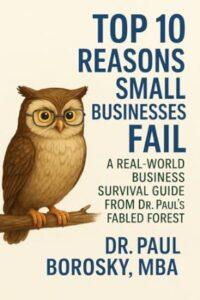Miami Business Plan Writer | Dr. Paul Borosky, MBA
Your CEO Partner — the behind-the-scenes force that makes CEOs stronger, sharper, and more effective
Call or text Dr. Paul at (321) 948-9588
Is your Miami business struggling to launch or grow because your business plan never provided a clear strategic roadmap? When a problem like this goes unresolved, your various business models as well as your financial projections often remain unrealistic, weak, or completely missing. This makes it difficult to secure funding with local banks or grow with confidence in competitive areas like Brickell or along the I‑95 Corridor. To make this situation even worse, many Miami business owners overestimate revenue while underestimating operating costs, labor pressures, and market competition unique to the South Florida market.
This is a common issue. Many entrepreneurs in the area struggle to understand exactly what lenders and investors expect to see in a business plan. That is where Dr. Paul, business plan writer, helps Miami business owners translate ideas and common startup/growth issues into lender-ready business plans with realistic models and financial projections that banks, SBA lenders, and investors trust.
Our Services Offered
Key Takeaways
-
Miami is a high-opportunity market—but only for businesses with structure.
-
Most Miami funding challenges are planning problems, not idea problems.
-
Miami magnifies mistakes in pricing, staffing, and cash flow.
-
A professionally written business plan creates leverage in Miami’s competitive environment.
Miami’s business landscape moves at a different speed — powered by constant activity along I-95, US-1, the Dolphin Expressway, and the booming Brickell financial district. From high-traffic tourism zones in Wynwood, Downtown, and Miami Beach to high-income neighborhoods like Coral Gables and Coconut Grove, Miami entrepreneurs face intense demand, rising operating costs, and fierce competition. Without a clear, professionally written business plan, most owners get drowned out — especially when lenders and investors in South Florida expect precision, financial clarity, and strong market research before they take you seriously.
South Florida Hub Serving: Miami | Hialeah | Doral | Miami Gardens | Kendall | Homestead | Coral Gables | North Miami
What You Get - What We Do...
Business Plan Writer Process
- Choose a business plan package (Express, Traditional, Complete)
- Complete our questionnaire
- Initial Meeting
- Approve the scope of work/Final Payment
- Plan is ready in 7 days - Guaranteed!*
Proven Results
- Trucking company in Raleigh, NC. - 205k funding ready plan.
- Convenience store in Miami, FL - 1.3 million funding ready plan.
- Bed and breakfast in Houston, TX - 850k funding ready plan.
- RV park in Central Florida - 950k funding ready plan.
- Daycare in Cleveland, OH - 75k
Ready to Stand Out in Miami's Competitive Market?
Text or Call Dr. Paul Today - 321-948-9588
Popular Industries in Miami, FL
HVAC Contractors – Growth Opportunities in Miami
Miami’s climate keeps HVAC contractors in constant demand, especially during peak heat months and hurricane season when systems often fail or require upgrades. Growth opportunities are strong in neighborhoods like Brickell, Doral, and Kendall, where new multifamily developments and renovated older homes drive year-round service calls. Contractors who offer energy-efficient solutions, maintenance plans, and rapid-response services can scale quickly in Miami’s competitive market by tapping into both residential and commercial demand.
Catering – Local Challenges in Miami’s Event-Heavy Economy
Catering companies in Miami face unique challenges tied to the region’s fast-paced event schedule, seasonal tourism swings, and fierce competition from restaurants that offer in-house catering. High staffing costs, transportation issues during major events, and the need for niche menu differentiation add extra pressure. Companies serving Downtown Miami, Coral Gables, and Miami Beach must balance fluctuating demand while maintaining quality and efficiency. Success often depends on tight logistics, menu specialization, and consistent customer service.
Ready to get started?
Food Halls – How New Operators Can Enter the Market
Food halls continue to grow in popularity across Miami, driven by foot traffic in Wynwood, Little Havana, and Downtown. New operators can break into the industry by starting with a focused concept, understanding local demographics, and offering menu items that stand out in a highly curated environment. Startup costs are generally lower than full restaurants, making food halls a practical entry point for first-time culinary entrepreneurs. Strong branding, creative menus, and efficient operations are essential for success.
Miami Industry Opportunity Matrix (HVAC, Catering, Food Halls)
Purpose: Show where opportunity is strongest and why Miami favors certain models.
| Industry | Primary Demand Driver in Miami | High-Opportunity Areas | Growth Outlook | Key Advantage for New Entrants |
|---|---|---|---|---|
| HVAC Contractors | Climate intensity + hurricane exposure | Brickell, Doral, Kendall | High | Recurring maintenance + emergency response |
| Catering | Events, tourism, corporate functions | Downtown, Coral Gables, Miami Beach | Medium–High | Niche menus + logistics execution |
| Food Halls | Foot traffic + curated dining demand | Wynwood, Little Havana, Downtown | Medium | Lower startup cost vs. restaurants |
FAQ
Why do Miami businesses need a professionally written business plan?
Miami’s seasonal swings, tourism surges, and event-driven economy create unpredictable revenue cycles. A professional business plan helps you manage these highs and lows with clear strategy, financial projections, and lender-ready documentation.
What makes Quality Business Plan different from template-based services?
Templates lack local insight and lender credibility. Dr. Paul creates fully customized business plans that highlight your strengths, refine your model, and differentiate you from Miami competitors.
How long does it take to complete a Miami business plan?
Most customized plans take between 5–10 days, depending on industry complexity, financial modeling needs, and the level of detail required for lenders or investors.
Can Dr. Paul help HVAC contractors, catering companies, or food hall startups?
Yes. Each plan includes industry research, growth analysis, competitive advantages, and financial modeling tailored specifically to these industries in Miami’s unique environment.
About the Author: Dr. Paul Borosky, DBA, MBA

Dr. Paul Borosky, MBA and DBA, CEO Partner dedicated to making CEOs stronger, sharper, and more effective, is the founder of Quality Business Plan, creator of Dr. Paul's Organize-Plan-Grow Strategy, author of numerous published books on Amazon, and publisher of over 1,000 business focused videos on YouTube. For over 14 years, he has helped entrepreneurs and small business owners turn business concepts into tangible businesses. Most recently, Dr. Paul has expanded his expertise into AI Business Integration, developing industry-leading strategies that use custom created and trained AI agents.
Related Links
Need help completing the business plan template? [Business Plan Writing Tutorials]


